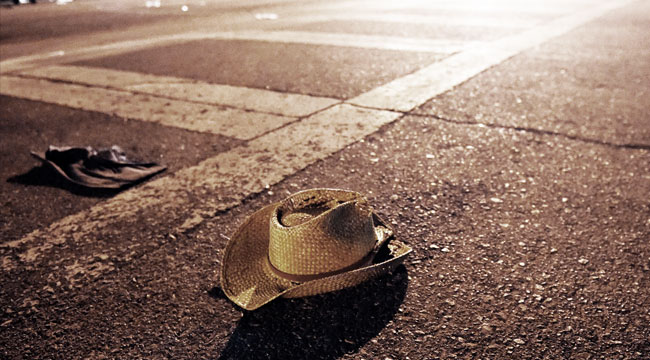
Like everyone in the wake of last night’s mass shooting at the Route 91 Harvest Festival in Las Vegas, I am trying to comprehend the incomprehensible today. In the days ahead, there will be debates about gun control and mental health care and what should and shouldn’t considered terrorism — all are important and necessary conversations, even if in the absence of tangible action they’ve come to feel a little rote.
As a person who attends dozens of concerts per year and values the live music experience as a sacred ritual, my immediate reaction is to ponder a different, numbingly familiar question.
Why do these attackers keep targeting my fellow music fans?
Let’s go over the senseless tragedies that have occurred just in the past two years. In 2015, there was the massacre during an Eagles Of Death Metal show at La Bataclan in Paris, where three armed men murdered 130 people. In 2016, there was the Pulse nightclub shooting in Orlando, previously the worst mass shooting in modern US history, in which 49 people were killed. In May, a bomb went off at an Ariana Grande concert in Manchester, England, killing 22 and injuring 59 people, many of whom were adolescent and teenaged girls. In July, 28 people were injured when gunfire broke out during a concert in Little Rock, Arkansas by rapper Finesse 2Tymes, an incident that was relatively under-reported, perhaps because our standards for what constitutes notable carnage in these situations has exponentially increased. And now there’s the horror of Las Vegas, which has already replaced Orlando as the new worst mass shooting, even as we wait to learn the exact number of casualties.
It’s true that people have died at concerts before now. But the difference is that these disasters used to be caused by gross negligence or incompetence. The havoc wreaked by biker “security guards” during a Rolling Stones concert at Altamont Speedway in 1969, the deadly stampede at a concert by The Who in 1979, the malfunctioning pyrotechnics that burned down a Rhode Island bar during a Great White show in 2003 — these were all terrible accidents. They were preventable, but they weren’t deliberate acts of murder and mayhem. They were essentially freak occurrences that happened so rarely that they came to mark different generations.
But this recent wave of mass homicide feels malicious as it has rapidly become the new normal at music venues. It doesn’t matter if you listen to rock, pop, country, rap, or dance music. It doesn’t matter where you live, or how old you are, or whether you’re a man, woman, white, black, brown, gay, or straight. Everyone has been impacted.
I have no idea what motivated the person who shot up the Route 91 festival. (I am intentionally not identifying him, because screw that monster.) But the result of his actions is that he’s terrorized millions of people beyond just those who were in attendance at the time he opened fire. Like the killers in Paris, London, and Orlando, the Las Vegas shooter invaded a communal space that people enter in order to feel connected to a warm, eternal spirit bigger than themselves. This is the promise of live music: It is one of the only remaining bulwarks against the omnipresent alienation of modern life, in which a variety of potent forces (technology, the media, a polarized political system) conspire to keep people divided and inside their own bubbles.
Concerts can also be a pain, of course, especially when the parking is too expensive, the beer is too warm, and the guy behind you is talking when he should be listening. But the ideal of the live show is still magical. When you go to a show, you are forced to breathe the same air as strangers who may be utterly unlike you in every way except that they also love the same music as you do. Somehow, that one commonality is enough to make us feel comfortable.
Once the music starts, a certain kind of mass hypnotism sets in. For once, you’re no longer stuck inside your own head. You are re-integrated back into the fabric of a greater, tactile humanity that you can feel without a wireless connection. When live music is at its best, whether you’re inside a tiny club or among tens of thousands in a stadium, the energy that’s created by a group of people fixating on the same sounds and sights is intoxicating. But in order for this to work, you have to lower your defenses. You need to make yourself vulnerable. Then, if you’re lucky, you can get lost in the moment, a blissful feeling that makes the possibility that someone might also have a gun pointed at you seem briefly inconsequential. But given this epidemic of random violence, that is now a consideration that people must take into account when they attend shows.
Again, I can’t speak to this latest shooter’s motivations, but I suspect that bad people are generally driven to violate the sanctity of music venues because these spaces signify community in an increasingly lonely and isolated world, even to people who are incapable of empathizing with others. These individuals see the rest of us being moved by art to dance, drink, laugh, and cry with people we’ve never met, and they view it as weakness. And they exploit that weakness to either kill us or frighten us back to our homes, our devices, and our closed-off belief systems.
Daily life has become a struggle against the temptation to burrow in and block out the outside world, to not make yourself available to others, to be less open, less empathetic. But we must continue to resist that impulse. The nourishment that live music provides is a powerful force for good in this world. We know this because it takes so much evil to temporarily silence it.






